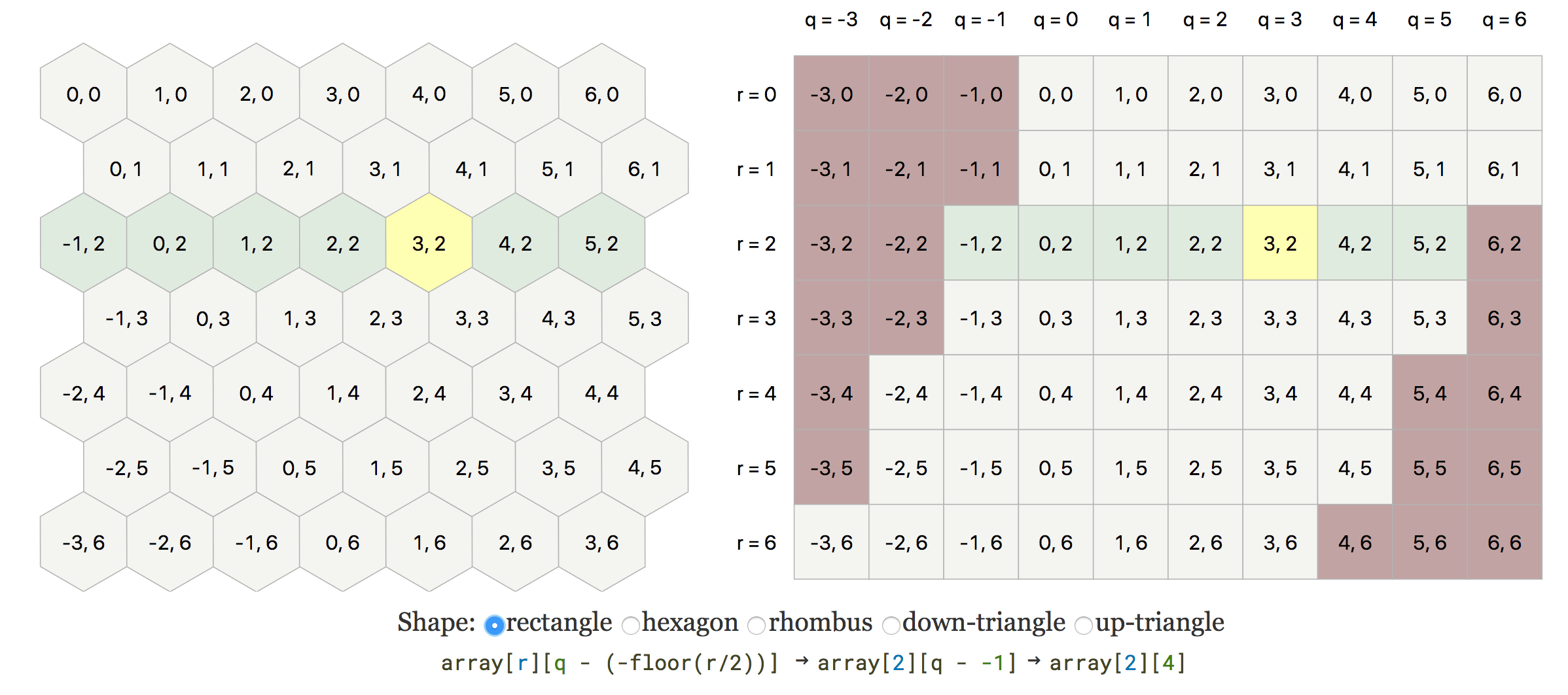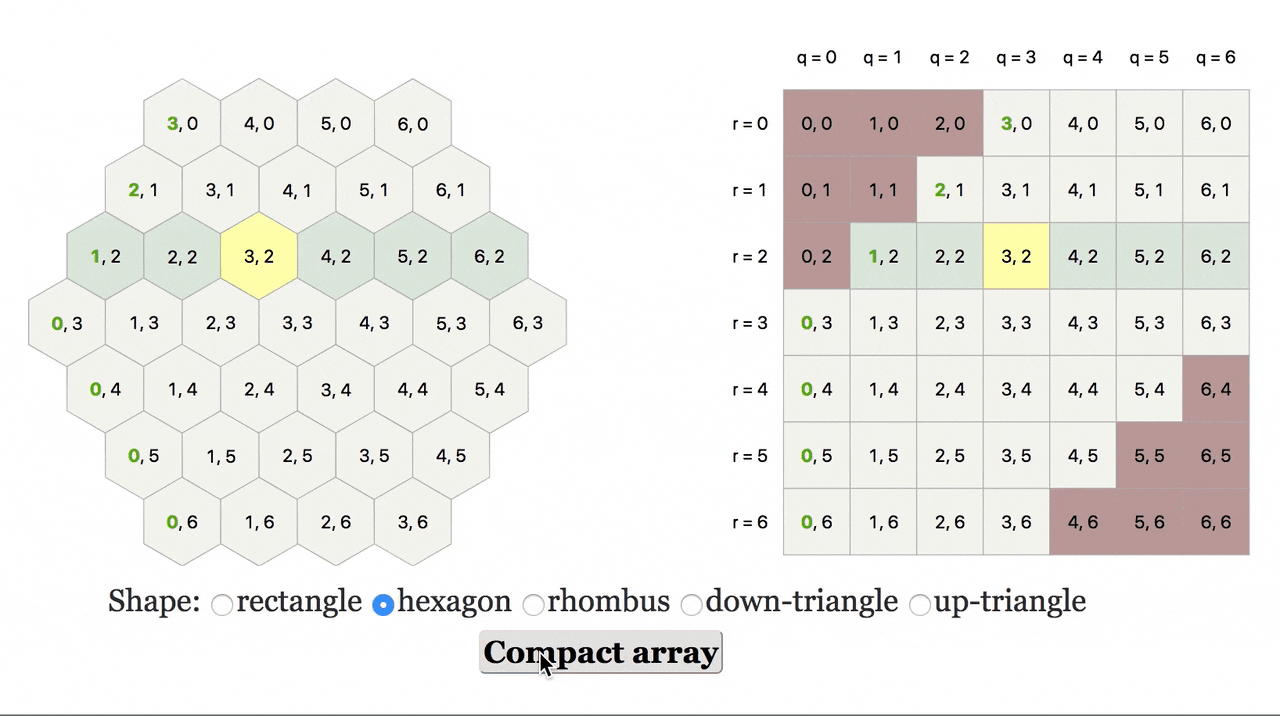Saturday, February 22, 2020
Retro-Stupid Is The New Purple
Before the featured video, I'd like to share this blog post from Jeff's Gameblog. It's his three-fold model of RPGs. Essentially, there are only 3 categories - retro, pretentious, and stupid. And he's right, of course.
Coincidentally, purple is the stupidest (veering towards retro) color in Jeff's model. ;)
Without further ado, here's the RPG Pundit reviewing Cha'alt...
If you enjoyed that, there's my current Kickstarter campaign to fund Cha'alt: Fuchsia Malaise.
If you want to order the fancy hardcover Cha'alt direct from me, this link has details.
VS
Friday, February 21, 2020
Spring Game Jam 2020 Is Right At The Corner!
Please check out more information here and check out the previous Game Jam events!
January 31- February 2, 2020
Opening Ceremony: January 31, 2020, 5PM
Improving Hexagon Map Storage Diagram
Last week, I decided to improve the map storage section of the hexagon guide. This section had a diagram that suggested the use of a 2D array, but then it presented formulas that didn't look like what was shown. Reader feedback made me realize this section was confusing. I was mixing two separate steps here.
- Store the map in a 2D array.
- Slide the rows to the left to save space.

The diagram showed step 1 but not step 2. The formula under the visualization showed step 2. Mismatch!
I think it's worth having two separate diagrams here. I couldn't figure out where to place the second diagram in the page layout, so I decided to instead make the one diagram animate between the two different approaches.

One of the advantages of writing text over making videos is that I can treat it as a "living document" that improves over time. The improvements are less frequent the longer the document has been around, but I am still updating the pages I wrote in the 1990s, and I intend to continue improving the new ones too.
Company Of Heroes Free Download



• Environmental Strategy destroy anything and reshape the battlefield use buildings and terrain to your advantage.
• Stunning Visuals Relic's next generation cutting-edge Engine provides graphic quality and a physics driven world.
• Real-time physics & completely Destructible Environment guarantee no two Battles ever play out in the same way.
• New Advanced AI brings your Soldiers to life as they interact with the changing environment take cover and more.
• Company of Heroes: Epic Cinematic Single Player Experience that captures the Turmoil of WWII, as never before.
▪ Company of Heroes: Complete Edition - Tales of Valor
▪ Company of Heroes: Complete Edition - Opposing Fronts
▪ Company of Heroes: Complete Edition - Soundtrack Compilation




♢ Click or choose only one button below to download this game.
♢ View detailed instructions for downloading and installing the game here.
♢ Use 7-Zip to extract RAR, ZIP and ISO files. Install PowerISO to mount ISO files.















(Your PC must at least have the equivalent or higher specs in order to run this game.)
• Processor: 2.0 Ghz Intel Pentium IV or equivalent or AMD Athlon XP or equivalent
• Memory: at least 1GB System RAM
• Hard Disk Space: 20GB free HDD Space
• Video Card: DirectX 9.0c compatible 64MB video card with Pixel Shader 1.1 support
If you have any questions or encountered broken links, please do not hesitate to comment below. :D
Thursday, February 20, 2020
Storium Theory: Don't Count Yourself Out
It feels right - it feels better than right, doesn't it? Isn't it a great expression of a Weakness to not just suffer a setback, not just suffer some kind of injury, but actually get knocked out or otherwise removed from play for a bit?
Well...it is, and it isn't.
Let's start off with the good: This is, undoubtedly, an example of a player being very willing to show his character suffering for his Weakness. That's great, and that's an attitude that I hope people learn on Storium.
But actually taking yourself out...getting knocked out, getting poisoned to the extent that you can't move, draining yourself so much of energy that you're too exhausted to go on...there are times these things are appropriate, but they need to be used with restraint.
Otherwise, they can mess with the flow of a story.
I've seen it happen: A battle happens, one part of a longer sequence of events all taking place in a short period of time. One player plays a Weakness card and portrays themselves as exhausted, or poisoned, or just plain knocked out cold. Then the battle ends.
Now a few things can happen:
- Somehow, the player character recovers very quickly, and keeps on going, so the story can keep moving. That's unsatisfying, as it feels like a major moment is just brushed over and somewhat ignored.
- The narrator puts in a point where the group can rest for a while to make it seem more realistic that the player character takes time to recover from his state...but now the story loses momentum.
- The story goes on, and the player character is put someplace safe to recover in the meantime, which means:
- The player misses out on part of the story, or...
- The narrator has to come up with things that happen around wherever the player character was left that they can work with in their current state.
Now...you can make this work. You can. A good narrator who is used to letting the players have heavy story control, especially, can make this work out great. Maybe the group has to stop to allow the player character to recover, but in the process, the problem they're trying to address worsens. Or maybe that's the next challenge: Can they find things to help the player quickly enough that the next challenges don't worsen in the meantime?
But the thing is, even though you can make this work...it just oftentimes ends up more trouble than it is worth to put in this strong of a Weakness play. You can get some great, great character moments and a strong feeling of struggle and danger and fading hope from injury or tiredness that still leaves the character able to go on to new fights.
Sometimes, that can be even stronger. If a character is knocked out, the group might stop to deal with that and then go on once he's recovered. If that happens, the knockout doesn't add as much tension to the story. If a character is injured or tired but still goes on, though, we see that in everything they do for the next few scenes - they're in a bad way, one arm too hurt to hold up their shield, or dragging themselves forward in the battle. It's powerful.
Stopping the story's progress can add some tension if managed properly, but continuing despite your wounds always adds tension.
I'm not saying that you should absolutely avoid major consequences as part of Weakness plays, mind! There are times when it is appropriate, entirely appropriate. Particularly late in the story, particularly when the narrator has told you this is the final battle, you might pull out these powerful Weakness plays. Because there - there - it won't make the story pause or lose momentum. It'll emphasize just how bad things are currently, just how much of a struggle it is for the characters...but there's nothing ahead that the players need to address.
Keep yourselves within the bounds of the challenge, but that is when you should be safer using some of these powerful Weakness concepts.
Before that? Before that, earlier in the story, don't go that far! Go lighter with what goes wrong...but use what goes wrong more. Pick up some kind of injury and carry it with you for the next few scenes, showing your character struggling with it. Show the tiredness that you're feeling, even as you struggle to move on.
Or almost encounter one of those points...and leave things open. Let someone else save you from them. Those can be amazing moments in a tale too.
Weakness plays don't have to be about solid, absolute consequences for your character. They can be about the threat of those consequences. They can be about what might happen if the battle isn't turned around. If you knock your character out, he's knocked out. That's certain. It's done. But if you put in the possibility, you're giving someone else the chance to write. And that's what Storium is all about - working with each other to write interesting or fun stories.
So I suggest pulling back from the solid a bit - work with possibilities. Get hurt and need help. Or, need help to avoid getting hurt. Get tired and struggle. Need someone's shoulder to lean on. Need someone to fight by your side. But unless the story really, truly demands it, don't get taken out entirely. That cuts off possibilities - like bluntly leaving in the middle of a conversation.
And if you're going to take yourself out at all, try not to do it while you still have card plays left for the scene! Hopefully narrators are taking my advice to not use up all their points, but still, it's useful if players keep open the option to play all their cards if needed.
Now, one more note here: I've already said that late in the story you might be fine pulling out heavier, solid consequences as part of a Weakness play if that's your thing. There are points earlier in the story where you might do that too. The narrator might even set them up specifically. If he does...go with it, obviously! If the Weak outcome is "you're all knocked out," well, that's what the outcome is, so do the normal thing with a Weak outcome if you get it and write your spin on that outcome! You get knocked out.
The narrator, obviously, will have planned for that possibility since he put it in the outcomes, right?
Similarly, you might find a situation where it feels like the consequences should be higher - where the outcomes suggest this battle or event is more dangerous than normal, or where you're already portraying your character in a bad way and it just feels like they should have something more solid happen to them on your next Weakness play. And that's fine...I just suggest that you consider talking to the narrator first. Remember, you're writing collaboratively: Check, when you're thinking about having something this major happen to your character, and work with the narrator to figure out how it can happen but still keep the story moving (and not exclude you as a player).
This isn't a solid "don't ever do this." I want to be clear on that. What it is is a caution: Be careful of how and when you do this. When a hero is solidly defeated in battle or exhausts herself in the service of a cause, that can be a great story moment. It's just important to make sure that it's the right time - and that it doesn't derail the story's momentum or leave it short of players in the process.
